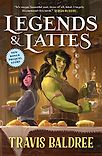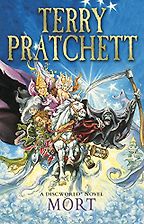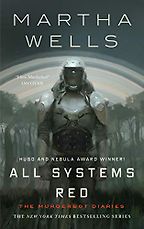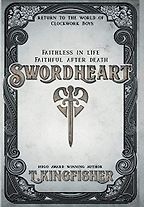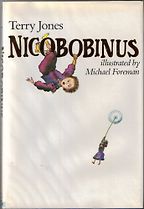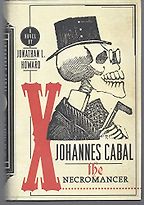Humorous fantasy has a long pedigree, starting out with Lewis Carroll, through the children’s stories of E. Nesbit and T.H. White, through to hugely popular authors today like Terry Pratchett and Tom Holt. What makes fantasy such a fertile genre for comedy?
Well, you aren’t limited as far as the cast that you can introduce – and I find that characters in humorous fantasy tend to be non-human. I think they let us talk about things in a way that we might not otherwise get to. And the very first book on my list is probably a really good example of that.
Then let’s get straight to it! Your first choice is by one of the gods of the genre, Mort by Terry Pratchett. Could you tell us a bit about it?
Mort is the first book that Terry Pratchett wrote that is entirely about Death, who is by far my favourite character – and many other people’s favourite character – in the Discworld series. It’s about Death taking a holiday and bringing on an apprentice named Mort, which is short for Mortimer, to take over for him. It’s split into two parts: one where Mort is bumbling around and learning to become Death, messing things up apocalyptically; and one where Death is spending some time thinking about life and death in a way that’s sort of philosophical. And like all of Pratchett’s stuff, it’s very, very funny, but it also feels like one of his deeper books.
I also put it on the list as a marker for Death as a whole in Pratchett. There are five main Death books, and I love all of them for totally different reasons. The only reason that I didn’t select Reaper Man is because it just felt a little out of order – but Reaper Man introduces the Death of Rats, another of Pratchett’s non-human characters and one of my favorites.
Death is fabulous. I don’t think I’ve ever seen death humanized in the way that Pratchett’s able to pull off.
I feel like every Pratchett fan tells me Death is their favourite character! What do you think the appeal is?
He’s got a sense of humour. I love the line, “I could just murder a good curry.” And Death is ultimately kind in a lot of ways. I think because of that, and because he’s so persistent – he can be involved in any story Pratchett tells – he’s just hugely endearing.
It’s interesting that having been invited to sympathise with Death in your first choice, the hero of your second choice is a murderous robot. Could you tell us a little bit about Martha Wells’s All Systems Red? Then maybe we’ll follow up on why these anti-heroes are so appealing…
All Systems Red is the story of a murderbot, a robot that has some human physiology, that slips free of their programming and becomes fully independent. And upon doing so, they only want to be left alone: to have the least dramatic and stressful time, and to stay under the radar so that nobody notices them. Which is really, really relatable. I often want to be left alone. I think we’ve all had that experience – wanting to not be bothered and to be able to get on with things.
Murderbot has a great sense of humour, a very snarky sense of humour, and it’s just a unique perspective. It’s got such a modern voice to it – I really adored the Murderbot series.
I’m interested in the relatability point. Do you think maybe character comedy in fantasy gives us an opportunity to laugh at characters we know, but writ large or seen in a new light?
It definitely does. Fantasy and science fiction are able to focus a really, really big lens on something human. In the same way that Star Trek lets us explore big ideas about society and culture and how we relate to one another, I think fantasy also allows us to examine and poke fun at ourselves in a way that doesn’t hurt. If I were to write a book about how I want to be left alone and watch television, that might be sad; but if fantasy can do it on my behalf, then that’s hilarious.
I’ve got to ask then – if you had to represent yourself through a stock fantasy character, what would you pick?
Gosh, well, in a lot of ways, Viv is me. So apparently I would have picked a female orc mercenary.
Well, that brings me to a question about your book Legends and Lattes. Your book is another example of sympathetic anti-heroes, who this time are deliberately choosing to go against expectations. This seems to be a theme you’re drawn to…?
It definitely resonates with me. Legends and Lattes is about an orc mercenary in her forties who decides she’s done the same thing for too long and wants to go into a different line of work. She retires from mercenary life to open a coffee shop, in a town that has never heard of coffee – and she discovers this whole group of people that she didn’t know existed, who help her realize that she’s more than the work that she does.
I wrote this as someone who did the same job into their forties and decided they didn’t like it, moved to a new city, started a new career and discovered a whole group of people that illuminated for me that I had more to offer than what I did. And I’m definitely attracted to that kind of experience.
I loved Legends and Lattes! But it must be enjoyed in a coffee shop with a cinnamon bun. It’s a great example of cozy fantasy – which brings us to your third choice – could you tell us about Swordheart by T. Kingfisher?
I really love Kingfisher’s work, and she writes very widely – whatever the heck she wants to write, which I admire a lot. But Swordheart is the story of a woman who is being pushed into a marriage with her clammy-handed cousin in order for her extended family to steal her inheritance. And she, in an effort to kill herself, makes the acquaintance of a warrior trapped inside a sword, named Starkis. It’s really a fantasy romance, and also a little bit of a road movie. They work toward reclaiming her inheritance, and meet lots of adorable characters along the way, like Brindle the Gnole, and Zale – he’s sort of a lawyer-warrior for the Church of the White Rat.
But it’s also just very, very funny. T. Kingfisher writes in a modern voice, which I really appreciate in fantasy. I love being able to immediately relate to the characters; I find with a lot of epic fantasy, there’s all this added distance in language and in culture that makes it harder for me to connect immediately.
Yes, I wanted to ask about how cozy fantasy and humorous fantasy relate. It does seem to me that when you make epic fantasy funny, you’re quite often sending up the genre. But when you make cozy fantasy funny, it’s a different kind of joke. Do you think there’s a relationship between cozy fantasy and humour?
Definitely. There’s this continuum of humour, right? You’ve got your dark, dark humour; you’ve got your Pratchett-level humour, which is a little bit sharp sometimes; then you’ve got the gentler humour; and then you’ve got your laugh-out-loud stuff, more the Douglas Adams end of things. And I think all of them work.
I think that being comfortable, being safe, often involves gentle humour, because that gentler humour is how we cope with the difficult things in life. That’s what we use to paper over some of the cracks.
Your fourth choice is from a different subgenre, which I’m also keen to discuss. This is Nicobobinus by Terry Jones – best known for his TV comedy career, and also for very serious medieval history books. But then he also has this classic whimsical children’s book. Could you introduce us?
Vanishingly few people have run into Nicobobinus – I almost never find anybody who has read this book – but it’s easily one of my favourite books ever. I had it read to me in school as a kid, and now I have a hardback, which is very beloved. This is the story of Nicobobinus and his very outgoing friend, Rosie, two kids living in Venice. One morning, Rosie wants to occupy them, ideally off having some kind of adventure; so first she suggests weeding the doorstep, and when Nicobobinus declines, she declares – ‘Oh, well then I guess we’re going to go find the land of dragons.’ And so their adventure begins.
They climb over a garden wall to get some fruit and are pursued through a manor. Nicobobinus is apprehended by a golden man who turns various parts of his body into gold. As they’re escaping, it turns out that the only cure for it is dragon blood, which is very convenient since they were going to the land of dragons anyway… But it also involves bloodthirsty monks, an ocean of mountains, and the City of Cries – delightfully weird. Everything about it is weird.
It felt subversive to read it. I think those books that you discover when you’re a kid where it feels like you’re getting away with something often tend to be favourites. It’s got a healthy measure of Python-esque nonsense… I just couldn’t love it more.
It seems like this sub-genre only appears in humorous children’s fantasy: the surreal caper. I’m thinking of Lewis Carroll, The Phantom Tollbooth, or Neil Gaiman’s Fortunately, the Milk. It seems like a very different skill to conventional storytelling – you’re asking readers to invest in something different, in the belief that you will continue to amaze them. What’s the secret sauce – what makes Nicobobinus brilliant and not just a fever dream?
There’s certainly a feverish quality to them. I think that as kids, we’re willing to suspend our disbelief much, much further than we are as adults – because everything seems possible when you’re a kid. When I was reading fantasy fiction as a child, I did have this lingering belief – maybe this could really happen to me. Maybe it just hasn’t yet. And I think the belief that truly fantastical things are possible is something that it’s sad to lose as we get older.
Even if you read a fantasy book as an adult, people still care about the physics. How would they carry that much gold from place to place? I’m sure the horses would have been tired by now. And how did they get from this end of the continent to the other end of the continent in only one day? We have these practicalities that nag at us. I don’t think kids really mind at all.
Let’s talk about your final choice, which is a more recent novel from Jonathan L. Howard: Johannes Cabal the Necromancer. Could you tell us about it?
It’s about a necromancer – obviously – who made a deal with the devil to acquire his necromancy, in exchange for his soul. And then he decides he wants it back. He travels to hell and avoids a bunch of paperwork, and confronts Satan, who presents him with a new deal. Satan provides him with a hellish carnival on a train and declares that if, in one year, Johannes can procure one hundred souls for him, he can have his soul back.
Cabal has no problem doing this. He’s definitely an anti-hero. But he’s also traveling with his brother Horst, who is a vampire, and Cabal’s conscience in a lot of ways. It’s really funny. It’s really, really weird, and incredibly enjoyable. There’s an element of slapstick with Cabal’s summoned zombies, but Johannes himself has a very dry, black sense of humour.
There’s something that feels really subversive about the plot. Faust is the most famous example, but the story of giving up your soul to the devil is a recurring story – and always a terrifying story. For whatever reason, it’s a recurring human fear. Does it feel subversive to laugh at it?
Some of the subversive feel comes from the fact that Johannes is just not a good guy. You get these little glimmers of his humanity drawn out by his brother – but he has no problem exchanging a hundred other people’s souls for his own. Ultimately he has goals that you can relate to… I’m not going to spoil the book. But I think we’ll also forgive a lot of characters if they’re funny.
Do you find yourself still rooting for him, or is the book not asking you to?
You still root for Johannes; you can’t help it. I think it’s because his brother is so likable, genuinely an empathetic and fundamentally good person. Horst sticks with him and sees something good in his brother, so we can too.
It feels like this book is maybe the most striking example of something all of your choices have in common… If we believe that fantasy archetypes come from fundamental fears and anxieties, then a genre where we laugh at all those things is fascinating to me. Obviously, we get wonderful escapism from these books, but do you think we get anything else?
I think in all books, the ones that we really connect to are the ones that have basic relatable human elements, experiences that we share with the characters, and ultimately probably the author. When we connect in that way, a story sticks with us. One of the reasons that Death is so wonderful in Pratchett is that he is very human, and thoughtful about what being human is, from the perspective of someone who’s been alive for an incredibly long period of time and observed humanity from all angles. I think all good stories have that human connection at the centre of them.
It seems like humorous fantasy is going from strength to strength. For a reader new to the genre, who are the contemporary writers to look out for?
Gosh! There are lots of fabulous writers. Well… Martha Wells. Seanan McGuire is really, really funny. Jonathan L. Howard. Neil Gaiman. And Tamsyn Muir – Gideon the Ninth and the Locked Tomb trilogy have a lot of incredibly amusing moments in them. And Nicholas Eames, Kings of the Wyld… Okay, I think we’ve got enough, right?
Plenty! Thanks so much for talking all things humorous fantasy with me today. I’m off to add these to my reading list…
Interview by Sylvia Bishop
October 15, 2023. Updated: October 23, 2025
Five Books aims to keep its book recommendations and interviews up to date. If you are the interviewee and would like to update your choice of books (or even just what you say about them) please email us at [email protected]
Five Books interviews are expensive to produce. If you've enjoyed this interview, please support us by donating a small amount.

